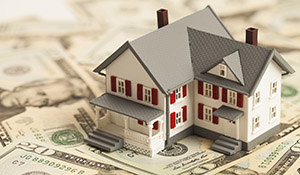Mortgage Refinancing Pros & Cons
January 28th, 2021 | 3 min. read

A financial resource that can help you sleep at night is literally the place where you sleep at night. Your home – and other real estate properties – are likely one of your largest financial assets.
With record low interest rates, refinancing your mortgage can give you some breathing room by lowering your monthly payments and saving you money over time. By some estimates, applications to refinance a home loan surged by more than 100% for the year.
Still, refinancing can be a little complicated, even though mortgage lenders have introduced online apps to speed up the process.
When you refinance, you’re essentially taking out a new loan on your property, often for the remainder that you owe. The intention is to set up a new loan that comes with better terms than your old one. The factors that determine those terms include how much equity you have in the house (how much of the mortgage you’ve already paid off) and your current credit score.
Refinancing sounds attractive, especially in a time of historically low rates, but it is not guaranteed to put you in a better position. It’s important to consider the pros and cons as they relate your personal situation.
Pros of refinancing your mortgage
Every home loan is different. Depending on the kind you qualify for, refinancing may benefit you in one or more ways, such as:
- Lower interest rate (APR)
- Lower monthly payment
- Shorter payoff term
- Cash from your equity
Perhaps, the most common reason for refinancing is to lower your mortgage payment, freeing up room in your monthly budget. This is welcome relief to people who suffer from a decrease in income (losing a job) or those with higher costs of living (having a new baby). And it is especially advantageous to those near or in retirement living off of a fixed income.
Refinancing can also give you a chance to pay off your mortgage faster. You can change the term of your current mortgage from a 30-year term to 15 years. This will likely change your monthly payment amount, depending on the interest rate you qualify for. But with your mortgage paid off faster, you have significantly less debt and more flexibility in using your home for income in retirement.
Speaking of income, refinancing can be an opportunity to use some of the cash from your home’s value toward other costs. This money can go toward other needs, such as paying off credit card debt or putting it in a college savings fund.
Cons of refinancing your mortgage
While refinancing has many benefits, it can have significant drawbacks if you’re not prepared. These include:
- Closing costs
- Wasting equity
- Longer term
Refinancing can save you money, but it isn’t free. There are closing just like when you originally purchased the property. They range from appraisal fees and title services to lender origination fees and underwriting fees. These can cost up to thousands of dollars in total, depending on where you live, the value of your house and the size of your loan.
When lenders offer no costs to refinance, what they really mean is that the closing fees are being added to the amount of your loan.
Paying those closing costs only makes sense if you intend to keep the property long enough to at least break even from the savings on your new monthly payment. For example, let’s say your closing costs are $5,000 and your monthly payment is $500 lower. You would break even in just 10 months. But if you only save $200 a month, you won’t truly start saving until after 25 months. If you move before then, refinancing your mortgage will end up actually costing you money.
You also need to have a plan for how you’ll use any money you free up when you refinance. This is especially important if you want to cash out your equity. If you want to use your equity on remodeling or another financial goal, like education, be sure to weigh the costs versus the rewards.
And if you intend to refinance with the goal of paying off high-interest debt, which many homeowners do, make sure you have a clear plan to avoid overspending or accumulating debt in the future.
Remember, if you spend the equity, you’ll have to wait until your home value increases and you’ve put more years of payments toward the mortgage, before you’re able to tap into that source of cash again.
Therefore, before refinancing, make a plan for what you want to do with the property and what you plan to do with the savings. If you decide to refinance, shop around to compare rates, terms and programs.
Advance Capital Management is a fee-only RIA serving clients across the country. The Advance Capital Team includes financial advisers, investment managers, client service professionals and more -- all dedicated to helping people pursue their financial goals.
